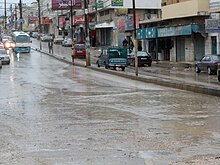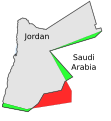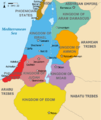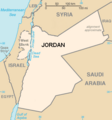Portal:Jordan
The Jordan Portal  Jordan, officially the Hashemite Kingdom of Jordan, is a country in the Southern Levant region of West Asia. Jordan is bordered by Syria to the north, Iraq to the east, Saudi Arabia to the south, and the occupied Palestinian territory of the West Bank and Israel to the west. The Jordan River, flowing into the Dead Sea, is located along the country's western border. Jordan has a small coastline along the Red Sea in its southwest, separated by the Gulf of Aqaba from Egypt. Amman is Jordan's capital and largest city, as well as the most populous city in the Levant. Modern-day Jordan has been inhabited by humans since the Paleolithic period. Three kingdoms emerged in Transjordan at the end of the Bronze Age: Ammon, Moab and Edom. In the third century BC, the Arab Nabataeans established their Kingdom centered in Petra. Later rulers of the Transjordan region include the Assyrian, Babylonian, Roman, Byzantine, Rashidun, Umayyad, Abbasid, and the Ottoman empires. After the Great Arab Revolt against the Ottomans in 1916 during World War I, the Greater Syria region was partitioned by Britain and France. The Emirate of Transjordan was established in 1921 by the Hashemite, then Emir, Abdullah I, and the emirate became a British protectorate. In 1946, Jordan gained independence and became officially known as the Hashemite Kingdom of Jordan. The country captured and annexed the West Bank during the 1948 Arab–Israeli War until it was occupied by Israel in 1967. Jordan renounced its claim to the territory to the Palestinians in 1988, and signed a peace treaty with Israel in 1994. Jordan is a semi-arid country, covering an area of 89,342 km2 (34,495 sq mi), with a population of 11.5 million, making it the eleventh-most populous Arab country. The dominant majority, or around 95% of the country's population, is Sunni Muslim, with the rest being mostly Arab Christian. Jordan was mostly unscathed by the violence that swept the region following the Arab Spring in 2010. From as early as 1948, Jordan has accepted refugees from multiple neighbouring countries in conflict. An estimated 2.1 million Palestinian (most of whom hold Jordanian citizenship) and 1.4 million Syrian refugees were present in Jordan in 2015. The kingdom is also a refuge for thousands of Christian Iraqis fleeing persecution. While Jordan continues to accept refugees, the large Syrian influx during the 2010s has placed substantial strain on national resources and infrastructure. The sovereign state is a constitutional monarchy, but the king holds wide executive and legislative powers. Jordan is a founding member of the Arab League and the Organisation of Islamic Co-operation. The country has a high Human Development Index, ranking 102nd, and is considered a lower middle income economy. The Jordanian economy, one of the smallest economies in the region, is attractive to foreign investors based upon a skilled workforce. The country is a major tourist destination, also attracting medical tourism due to its well developed health sector. Nonetheless, a lack of natural resources, large flow of refugees, and regional turmoil have hampered economic growth. (Full article...) Selected article -The Battles of Latrun were a series of military engagements between the Israel Defense Forces and the Jordanian Arab Legion on the outskirts of Latrun between 25 May and 18 July 1948, during the 1948 Arab–Israeli War. Latrun takes its name from the monastery close to the junction of two major highways: Jerusalem to Jaffa/Tel Aviv and Gaza to Ramallah. During the British Mandate it became a Palestine Police base with a Tegart fort. The United Nations Resolution 181 placed this area within the proposed Arab state. In May 1948, it was under the control of the Arab Legion. It commanded the only road linking the Yishuv-controlled area of Jerusalem to Israel, giving Latrun strategic importance in the battle for Jerusalem. Despite assaulting Latrun on five separate occasions, Israel was ultimately unable to capture Latrun and it remained under Jordanian control until the Six-Day War. The battles were such a decisive Jordanian victory that the Israelis decided to construct a bypass surrounding Latrun so as to allow vehicular movement between Tel Aviv and Jerusalem, thus avoiding the main road. Regardless, during the Battle for Jerusalem, the Jewish population of Jerusalem could still be supplied by a new road, named the "Burma Road", that bypassed Latrun and was suitable for convoys. The Battle of Latrun left its imprint on the Israeli collective imagination, though in two different versions, and constitutes part of the "founding myth" of the Jewish State. The attacks cost the lives of 168 Israeli soldiers, but some accounts inflated this number to as many as 2,000. The combat at Latrun also carries a symbolic significance because of the participation of Holocaust survivors. (Full article...)Selected biography -Hussein bin Abdullah (Arabic: الحسين بن عبد الله, Al-Ḥusayn ibn ʿAbd Allāh; born 28 June 1994) is Crown Prince of Jordan as the eldest son of King Abdullah II and Queen Rania. He is a member of the Hashemite dynasty, the royal family of Jordan since 1921, and is considered to be 42nd-generation direct descendant of the Islamic prophet Muhammad. Hussein is a Captain in the Jordanian Armed Forces, started his education in Jordan and in 2016 he graduated from Georgetown University with a degree in International History. Since reaching the age of majority in 2012, Hussein served as a regent on several occasions and has accompanied his father on a number of local and international visits. (Full article...)WikiProjectFor editor resources and to collaborate with other editors on improving Wikipedia's Jordan-related articles, see WikiProject Jordan. General images -The following are images from various Jordan-related articles on Wikipedia.
Selected city -
See also: List of cities in Jordan
Related portalsReligions in Jordan Arab states Other countries Recognized content
Featured articlesGood articles
TopicsSelected topic overview -
CategoriesSelected picture - The Karak Castle (c. 12th century AD) built by the Crusaders, and later expanded under the Muslim Ayyubids and Mamluks.
Associated WikimediaThe following Wikimedia Foundation sister projects provide more on this subject:
SourcesDiscover Wikipedia using portals |

























































